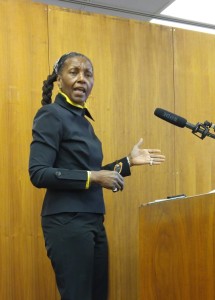Female entrepreneurs overcame stereotypes for wealth and fame
In the early 20th century, when African Americans still faced oppression with limited civil rights, Annie Malone and Madame CJ Walker defied stereotypes of black women.

Gwen Moore, curator from the St. Louis history museum, speaks at the Lovejoy Library on March 26. (Photo by Joseph Lacdan)
Both women rose to national prominence in the business world and earned fortunes. Malone became the first African American female to become a multi-millionaire, building a business on hair care products.
At the time, most black women were relegated to taking domestic jobs such as house keeping.
“By the very fact that they were engaged in business, they were defying gender roles because they were doing something that women did not do and were not allowed to do,” St. Louis history museum curator Gwen Moore said.
Malone and Walker, and other African American women, left a legacy of innovation and business savvy that at times supplanted their white counterparts. During Moore’s presentation titled “Market Queens,” she discussed the lives of these women during a presentation at the Lovejoy Library March 21, sponsored by the Black Studies department.
“Even with enslavement, which is a particularly oppressive system, some black women are able to negotiate hostile environments and engage in enterprise,” Moore said.
Malone, the first Market Queen, created a beauty school known as Poro College, housed in a sprawling $350,000 building in downtown St. Louis. There Malone trained 75,000 Poro agents and had a staff of as many as 240 employees. Malone’s products were sold worldwide, reaching countries in the West Indies and Africa. Malone was also a philanthropist who wanted to create jobs for black women.
During Malone’s time, segregation plagued St. Louis and blacks were restricted from going to public places, such as hotels and restaurants. Malone’s college also served as a multipurpose cultural center, a hotel for traveling blacks, and a theater center for the arts. Malone invited an all-black orchestra to perform at the college. Malone also donated money to the Howard Medical School, to the NAACP and to the local YMCA.
Madam CJ Walker often is credited with becoming the first female black millionaire, although Moore said the historical record shows that Malone was the first to truly achieve that status. Moore said Walker gained more fame for her accomplishments because her life story was romanticized in two books and a novel. Walker was a pioneer in her own right, who went from living in a home with a dirt floor, to owning a lucrative business and becoming neighbors with John G. Rockefeller.
Walker was also impacted by Malone, having spent time as a Poro agent in 1903. Walker then moved to Colorado, where she successfully developed and sold her own line of hair care products. Like Malone, Walker also led the push for more employment opportunities for black women. “These women all have a racial consciousness and they had a feminine consciousness,” Moore said.
Moore said the traits of early African Americans like Walker and Malone can be traced back further. African women, earned the names “Market Queens” because of their authority positions as merchants and traders in the African markets. African women acted as authority figures, serving as market regulators.
Even as slaves in the New World, female African slaves displayed a talent for business acumen, by taking a similar role in the Charleston Markets in South Carolina in 1739. Black female slaves sold foodstuffs competing with white counterparts before taking over the markets and earning money for their owners. Moore said gender roles changed when European colonists in Africa intervened.
“This whole concept of man as a bread winner was a European concept,” Moore said. “Colonial officials tended to view women in Victorian times. Women were supposed to be in the private sphere; they were not supposed to be in the public sphere. They were not supposed to be out in the world earning, money.”
“When Colonial officials came to Africa, they tried to impose their concept of what a woman should do and be. They were upsetting a long tradition of rough equality.”
Filed Under: African Studies • Black Studies












